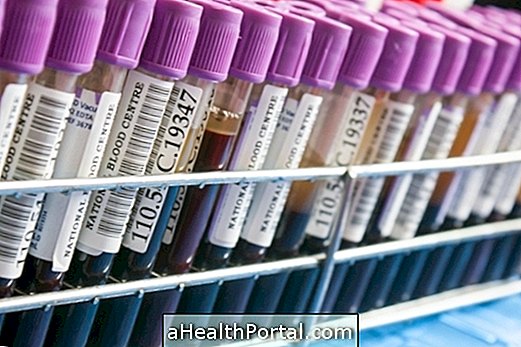FSH, also known as follicle-stimulating hormone, is produced by the pituitary gland and has as a regular function the production of spermatozoa and the maturation of eggs during their fertile age. In this way, FSH is a hormone linked to fertility and its concentration in the blood helps to identify whether the testicles and ovaries are working properly.
The FSH reference values vary according to the person's age and gender and, in the case of women, with the menstrual cycle phase, and may also be useful for confirming menopause.

What is the FSH exam for?
This test is usually asked to evaluate whether the couple has preserved fertility if they are having difficulty becoming pregnant, but it can also be requested by the gynecologist or endocrinologist to evaluate:
- The causes of lack of menstruation or irregular menstruation;
- Precocious or delayed puberty;
- Sexual impotence in men;
- If the woman has already entered the menopause;
- Whether the testicles or ovaries are working properly;
- The low sperm count in males;
- If the woman is producing eggs properly;
- The function of the pituitary gland and the presence of tumor, for example.
Some situations that may change the outcome of the FSH exam are the use of birth control pills, radioactive contrast examinations such as those made for thyroid, as well as the use of medicines such as Cimetidine, Clomiphene and Levodopa. The doctor may recommend that the woman stop taking the birth control pill 4 weeks before the test.
FSH reference values
FSH values vary according to age and gender. In infants and children, FSH is not detectable or detectable in small concentrations, with normal production beginning at puberty. FSH values usually decrease when a woman enters menopause.
The FSH reference values may vary according to the laboratory, usually:
Children: Up to 4 mIU / mL
Male: 1.27 - 19.26 mIU / mL
Woman:
- Follicular: 3.85 - 8.78 mIU / mL
- In the luteal phase: 1.79 - 5.12 mIU / mL
- In the middle of the cycle: 4.54 - 22.51 mIU / mL
- After menopause: 16.74 - 113.59 mIU / mL
Usually FSH is not required in pregnancy, since the values are greatly altered in this period due to hormonal changes. Learn how to identify the phases of the menstrual cycle.
Possible FSH changes
What FSH stands for
- In Women: Loss of ovarian function before age 40, postmenopausal, Klinefelter syndrome, use of progesterone drugs, estrogen.
- In man: Loss of testis function, castration, testosterone increase, Klinefelter syndrome, use of testosterone drugs, chemotherapy, alcoholism.
What is FSH Low?
- In women: The ovaries are not producing adequate ovules, pregnancy, anorexia nervosa, use of corticosteroids or the contraceptive pill.
- In man: Low production of spermatozoa, decreased pituitary or hypothalamic function, stress or low weight.






















